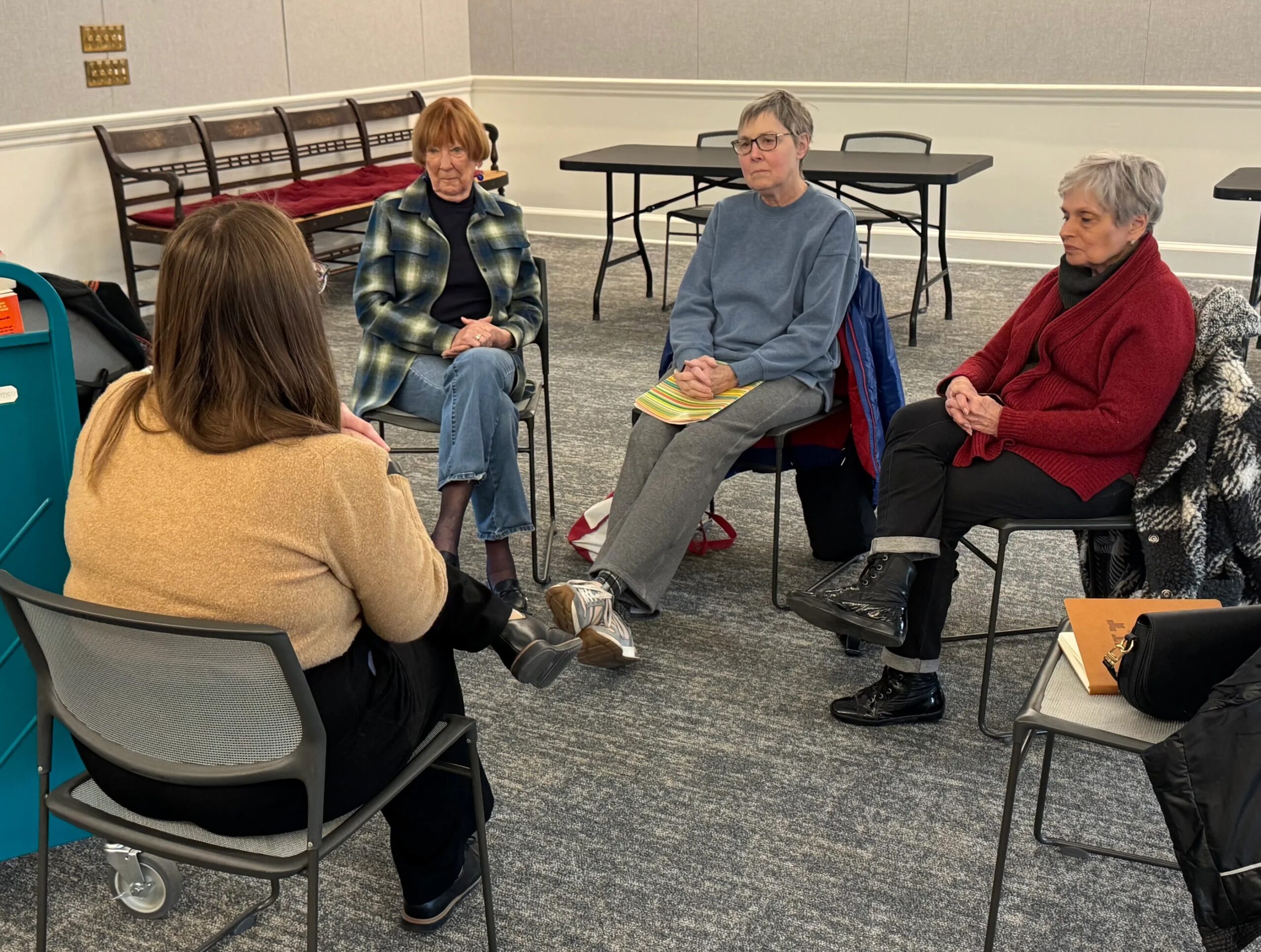
By Blessing Reynolds | UConn Journalism
January 21, 2025
For Suzanne Thompson, co-chair of the Rocky Hill Senior Book Club, joining the book club was about finding a community.
“I moved here to Rocky Hill in 2019, and I needed a tribe, I needed more than just my family,” Thompson said. “When I heard about the book club at the senior center, I thought that would be another source of people to get to know.”
Thompson said the senior book club helps foster deeper connections and discussions that go beyond literature. The group’s primary focus is discussing the assigned book, but Thompson said that conversations sometimes shift to community concerns or current events.
For many people like Thompson, book clubs are more than just literary discussions once a month. They are a chance for social interaction and connecting with like-minded people.
These and similar community programs give their members a crucial sense of connection at a time when loneliness and social isolation are acknowledged as public health crises.
Shana Shea, the Barney branch manager and marketing and communications librarian for the Farmington Library, shared how the library’s book clubs are innovating to address the need for connection. The three book clubs the Barney Branch offers are the Novel Ideas Book Group, the No-Book Book Club, and the Silent Book Club.
Each book club is unique. The Novel Ideas Book Group is the longest-running and most popular at the library. The No-Book Book Club has an open-ended approach where discussions aren’t tied to a specific reading. The new Silent Book Club gives participants a low-pressure environment for members to read independently.
“The silent book club fulfills two things,” Shea said. “It’s an opportunity it’s an opportunity to meet new people and potentially —because it’s not mandatory—discuss books with others without an assignment of what book to read. It also appeals to individuals who mainly are more introverted and don’t necessarily feel like they can join one of our other book clubs that are more discussion based but want to get out of their home.”
The Silent Book Club at the Barney Library started in September and meets on the first Saturday of the month at 10 a.m. In silent book clubs, unlike traditional book clubs, there is no assigned reading. This structure makes the club more appealing to people who prefer the freedom to make their own reading choices. Members quietly read in the space and decide whether or not to interact with other members before or after the reading sessions.
According to Shea, the newest club has more middle-aged to senior-aged members.
Brittany Pearson, the reference librarian at the North Haven Memorial Library, explained why silent book clubs appeal to attendees.
“Say you have a busy life, you’re a parent, there’s no quietness at home, coming to a silent book club is guaranteed time once a month where you could just sit and read and not have to be interrupted,” Pearson said. “There’s also the idea of body doubling. So, if someone is doing a similar activity in the same space as you so you can do it as well to help people who have attention deficit issues.”
“What I’ve been so happy to witness through these book clubs is the forming of friendships,” Shea said. “People who did not know each other before the book club have become friends. They make plans to get lunch beforehand or go out after.”
The friendships fostered in book club meetings also extend outside of the meetings. Shea said members check in on each other when someone is ill or injured, showing how genuine bonds can form within book clubs.
Loneliness is not only a social concern, but a public health issue. According to the World Health Organization, one in four older adults experience social isolation.
In 2023, U.S. Surgeon General Dr. Vivek H. Murthy highlighted the seriousness of this problem in his advisory report “Our Epidemic of Loneliness and Isolation.”
“Loneliness is far more than just a bad feeling – it harms both individual and societal health,” Murthy wrote in a letter at the beginning of the report. “It is associated with a greater risk of cardiovascular disease, dementia, stroke, depression, anxiety, and premature death.”
To address this issue in Connecticut, Gov. Ned Lamont and Lt. Gov. Susan Bysiewicz announced the “Social Connection Campaign” to combat social isolation and loneliness.
Lexi McNamara, a small group communication instructor at the University of Connecticut, explained why these group connections are so crucial.
“There’s this theory in communication called social penetration theory which basically states that people have layers to themselves, and communication helps to peel back those layers,” McNamara said. “In a book club we’re asking each other questions about what we think about the book, or anything related to the book and this kind of gives us a chance to keep peeling those layers back.”
Book Clubs and improved mental health

Research suggests that book clubs can have some notable mental health benefits for their members. A recent study, “How an Intergenerational Book Club Can Prevent Cognitive Decline in Older Adults” investigated the impact of book clubs on depression, cognition, and overall well-being.
The pilot study found and emphasized the advantages of intergenerational book clubs where older adults can connect with younger participants. Weekly meetings allowed members to create meaningful interactions.
Nairán Ramírez-Esparza, an associate professor at UConn in the department of psychological sciences, explained how the quality of conversations within groups plays an important role.
“When you are with people who have shared identities what you’re doing is exchanging information that is of quality,“ Ramírez-Esparza said. “If you are in groups you have more opportunities to laugh, and laughter is really good for your health.”
Other research emphasizes the importance of meaningful interactions in improving well-being. In the study “Eavesdropping on Happiness: Well-Being Is Related to Having Less Small Talk and More Substantive Conversations,” social interactions among the participants lead to a happier life.
“Together, the present findings demonstrate that the happy life is social rather than solitary, and conversationally deep rather than superficial,” Matthias R. Mehl, a University of Arizona psychology professor, and his co-researchers found in their study.
Book clubs, which encourage in-depth literature discussions, foster an environment of meaningful connections.
The Growth of Book Clubs
Book clubs have a long history of being a staple for fostering community. A 2021 article, “A Brief History Book Clubs,” from NC Stage Company, estimated that “there are now more than 5 million book club members in the United States, with most clubs comprising less than 10 members.” Smaller settings like this allow for more long-lasting connections.
As more community centers and libraries adapt to meet their members’ needs and attract new ones, book clubs are growing as a cure for social isolation.
“Each of them builds their own specific communities,” Pearson said. “An interest is a starting point and then and people connect and find what else they have in common.”
